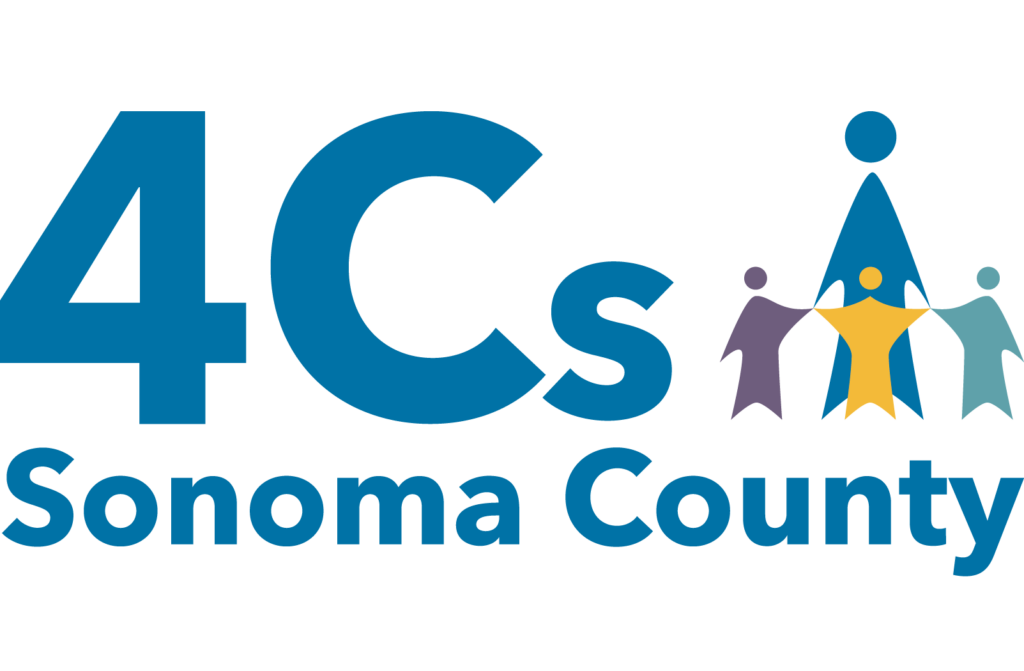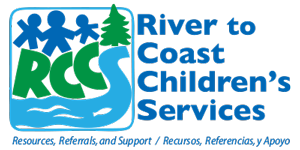
Wild Tenders Youth Program
2025/26
youth program participants // photo by Dave Hage
Wild Tenders is a 9-month nature-based learning journey for youth 4 to 14. Our goal is to cultivate earth intimacy, embodiment, and a commitment to co-liberation in the youth we work with… all while having lots of FUN. These interwoven threads reinforce how caring for ourselves, each other, and the earth are inextricably linked.
At Wild Tenders, the local ecosystem is the classroom — the woods, creeks, meadows, hills, plants, and animals come magically alive through exploration, interaction, story, and consistent contact through the seasons. This direct experience and meaningful play help our students to know themselves as interdependent, ecological beings.
As with all of our programs, Wild Tenders is simultaneously committed to education that cultivates earth intimacy and that interrupts the socialization of dominant, oppressive systems that have caused so many social, ecological, and existential crises that we face today. We do this work in service to our vision of a world deeply rooted in interrelationship, respect for life, and shared protection of the planet upon which we all depend.
What parents say…
“As [our son] gets older, it is even more apparent how deep his connection to life and all involved is. He is part of this earth and humanity in a really connected way. Wild Tenders has given him something that has become part of who he is in his core. The program means so much to him, he even talked about one day being a mentor.”
“Our child’s mentor was extremely talented at realizing the needs and proclivities of each child in the group, which greatly contributed to our child feeling well supported. Our child has historically been more on the shy side in groups, but her connection and support from the mentor really increased her confidence and participation in the group.”
TABLE OF CONTENTS
I. PROGRAM GOALS
The following attributes are our current best articulation of what we’re striving for. We offer them as the underlying intention for this program. We also offer them as practical guides that we use to assess growth in the youth over the year. This is different from grading or other kinds of standardized evaluation. This is a form of relational tracking. Imagine that each of these attributes is a flower that is unique in form to each child — our responsibility is to assess how each of these attributes are blooming uniquely within each child, and whether certain attributes need more care and attention.
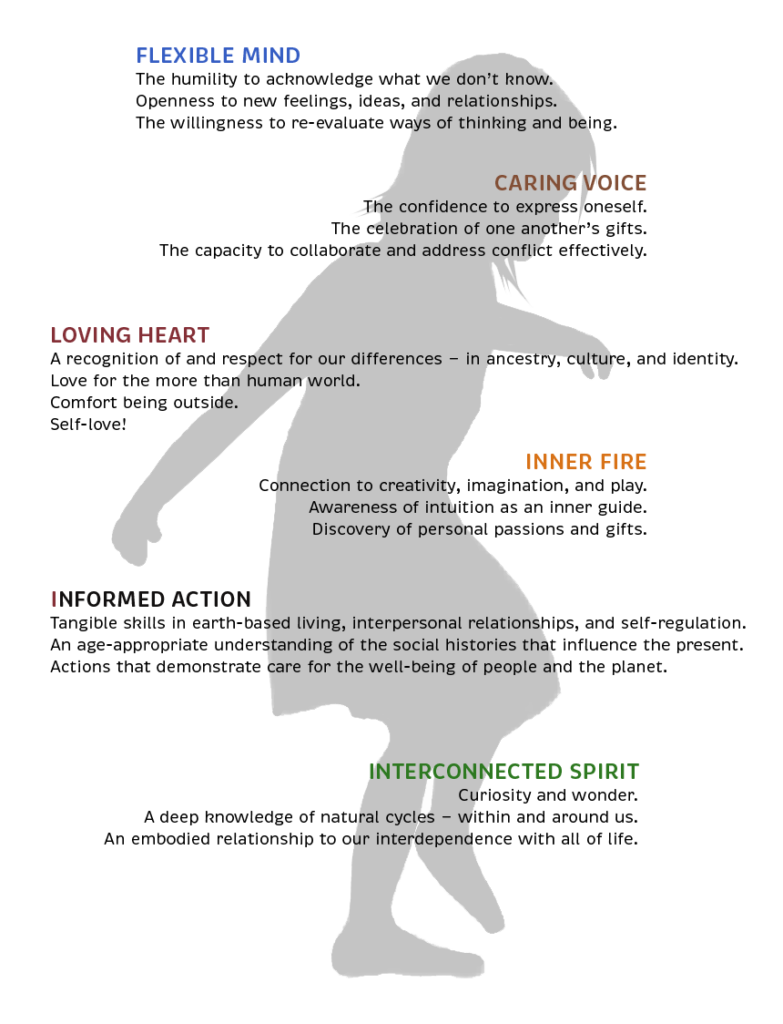
II. PROGRAM dETAILS
Please read the following sections carefully, especially if you have participated in Wild Tenders before! Any questions? Contact youthprograms@weavingearth.org for assistance.
1. AGE GROUPS
QUAIL COVEY
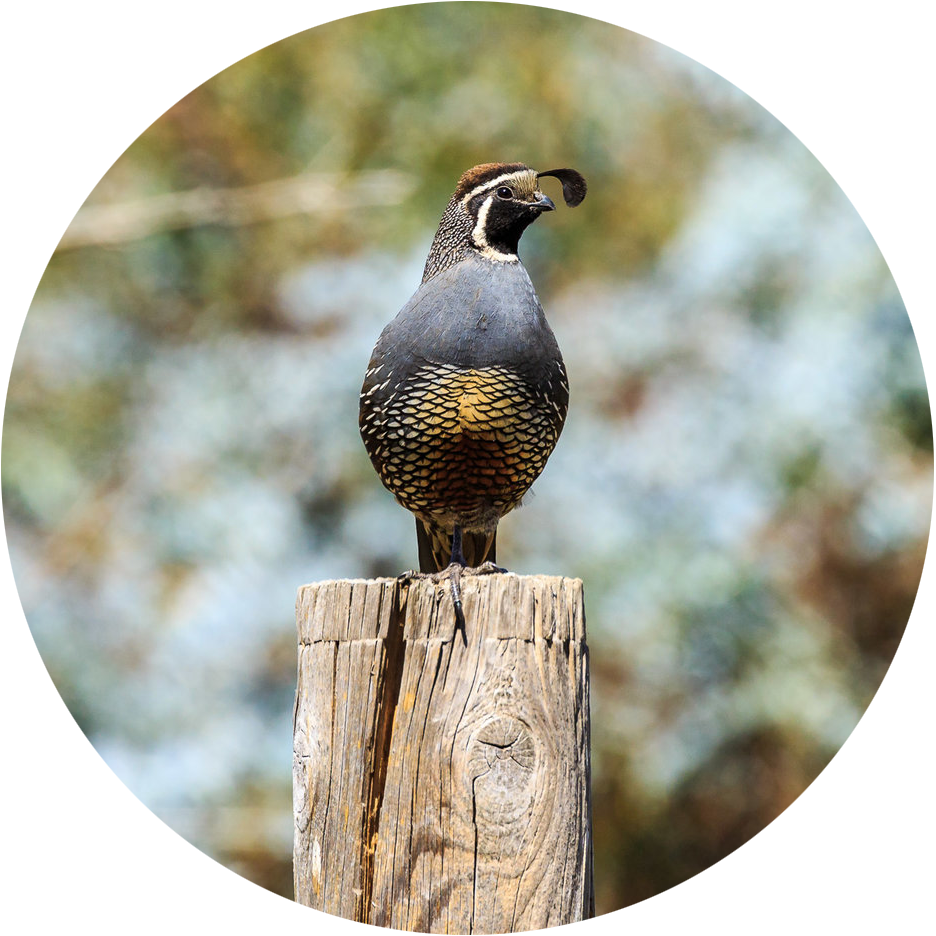
4-6 YEAR OLDS
TUESDAY
WEDNESDAY
THURSDAY
OTTER ROMP
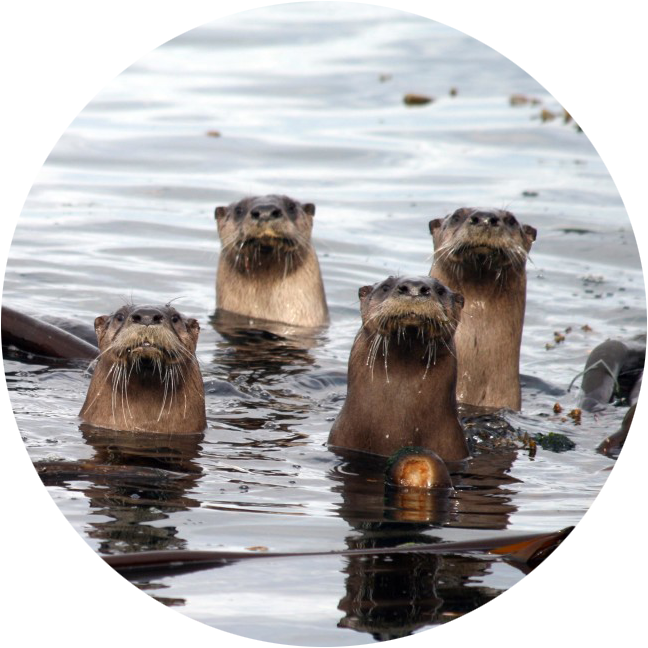
7-10 YEAR OLDS
TUESDAY
THURSDAY
BOBCAT POUNCE
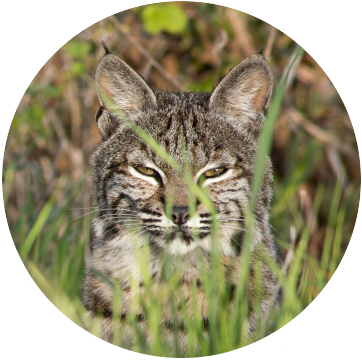
11-14 YEAR OLDS
TUESDAY
FRIDAY
PLEASE NOTE: For youth who are on the cusp of these age groups (3-turning-4, 6-turning-7, or 10-turning-11, e.g.), we like to have a conversation with the parents to decide whether the younger or older group is a better fit.
For many members of our youngest cohort, Wild Tenders represents one of their first social group experiences outside the home — perhaps the first. With this in mind, we focus on building social and emotional learning foundations. Doing so in nature means that the experience is also ecological: the Quail Covey is a place to remember that humans are also nature. As we make friends with new humans and wild creatures, the mentors help those budding connections bloom. And, to water those blossoms with foundations of care and respect for our ecological neighbors, ourselves, and each other.
The underlying curriculum in our Quail Covey is play and wandering the land with curiosity as a guide. We build confidence through exploration—jumping in puddles, running and falling down, digging, and immersing our physical bodies in the earth. Through tactile experience and free play, we encourage the youth to get their hands dirty and interact with the world. Through structured and unstructured activities, we strive to deepen each participant’s comfort with the world around them.
Storytelling is a central practice for deepening relationships with the world around and within. The mentors share stories and picture books that promote ecological understanding and empathy. Stories are told from diverse perspectives, genders, races, and species. This approach embeds in the young hearts and minds of the Quail that there are many different ways to be, none of which are “right” or “wrong”. We also encourage the Quail to tell stories of their own – both real-life and imaginary. This helps them to learn that their voice, experiences, and love for the world around (and within) them matters.
In support of socio-emotional learning, we offer and model teachings of consent and body boundaries. These practices teach us to respect ourselves and one another and make room for the need to change and evolve. The topic of consent deepens through the years as we understand more fully what our boundaries are and how they may differ from or be similar to the boundaries of others.
We also empower each child to know and inhabit their identities and to respect the identities of others. Studies show that kids are aware of identity and the social benefits or disadvantages associated with those identities at a very young age. Activities and stories that interrupt dominant storylines and socialized patterns of either/or, right/wrong, and good/bad can provide robust foundations for a commitment to equity as the kids grow up. This involves teachings about interdependence and interrelationship, consent, conflict resolution, compromise, and the reality that we all have different needs and desires in different moments.
The Quail experience sets a foundation that can be layered upon in later cohorts. We begin and end each day in gratitude. We express care for the places we visit and the beings we interact with. We tend to our physical spaces, our materials, and our belongings with respect. We encourage creativity through story, art, and song (many of which are co-written by youth and mentors!). We share lineages when introducing activities, songs, and stories. This foundation creates a framework of intentionality and creative expression built upon in the older age groups.
Building upon the foundations of the Quail Covey, the older cohorts continue many of the same practices — storytelling, games, structured and unstructured play — while adding age-appropriate developments to support deeper learning and experience.
Some ways this occurs in a given day:
We embark on daily wanders, adventures, and explorations — each with a storytelling component to encourage creative expression through movement, song, art, and play.
We balance high-energy games with quieter practices. Sit spot—one of the simplest and also most profound Earth Intimacy practices—helps the older kids develop their observation skills while providing a quiet, slow, attentive, and reflective routine.
We combine curiosity, observation, and intellect to begin thinking like ecological designers, asking: How does water move? How could we support the flow of water? What does this forest need to be healthy?
We deepen these questions to encourage the embodied experience that we are ecological beings, too: What happens to our bodies when we are dehydrated? What happens to the soil when it is dehydrated?
We attune to birdsong, balance on uneven terrain, crawl through the brush, and find outlets that support the kids’ personal developmental edge and sensory stimulation.
We learn tools for physical and emotional regulation. What shape does my body take when I’m angry, sad, or feeling defeated? How can I move my energy in a way that does not harm others while still communicating my needs?
We deepen in co-liberatory practices, celebrate each other’s similarities and differences, and play games that introduce ourselves via many layers—interests, family backgrounds, pronouns, etc. We steer away from language and activities that reinforce binary gender norms. When introducing activities, songs, and stories, we share lineages.
We interrupt language that can or does cause harm and do so in a way that does not emphasize good/bad or right/wrong but instead supports learning, care, and love in peer relationships. We work directly with consent and body boundaries. And we respond in the moment to what arises (as things inevitably do!).
Each child is encouraged to take the initiative to protect what they love. This can look like attending a youth-led climate action, sending letters to local government officials, or tending to the forest or the creek. We aim to provide an experience that is FUN and a Prayer for Action!
DO YOU HAVE A 3-YEAR-OLD?
We are considering adding a program for 3-year-olds! Lovingly dubbed the Quail Chicks Playgarden, this program will weave Waldorf-inspired approaches into a nature-based experience for the wee ones. Please take the community survey below to let us know that you’re interested and to indicate which days work best for you.
2. WEEKLY SCHEDULE
Wild Tenders day-long programs run from 9 AM to 3 PM for all age groups. You can apply for any day or combination of days that you want.
Quail meet on Tuesday, Wednesday and/or Thursday.
Otters meet on Tuesday and/or Thursday.
Bobcats meet on Tuesday and/or Friday.

AGES 4-6
QUAIL

AGES 7-10
OTTERS

AGES 11-14
BOBCATS
MONDAY
OFF
OFF
OFF
TUESDAY
QUAIL COVEY 1
OTTER ROMP 1
BOBCAT POUNCE 1
WEDNESDAY
QUAIL COVEY 2
OFF
OFF
THURSDAY
QUAIL COVEY 3
OTTER ROMP 2
OFF
FRIDAY
OFF
OFF
BOBCAT POUNCE 2
3. DAILY SCHEDULE
All cohorts follow a similar daily rhythm. This varies daily depending on the season, group energy, and other factors, but the rhythm below will give you a sense of how the day is structured.
9 AM — Drop-off + morning tasks (e.g., making tea, preparing firewood, harvesting medicinal plants for use)
9:15 AM — Opening Circle + Gratitude + Snack (+Storytime for the Quail)
10 AM — Morning typically involves adventuring out on the land, away from central camp, to one of the group’s favorite destinations. There are plenty of games, educational activities, and spontaneous encounters along the way.
12 PM — Lunch (+Storytime for the Quail)
12:30 PM — Return to base camp for “crafternoon.” We typically use the afternoon for more focused projects: arts and crafts, spoon carving, firemaking, natural dyeing, wild food preparation, et cetera.
2:30 PM — Clean up + Closing Circle
3:00 PM — Pick-up
4. ANNUAL CALENDAR
To see a detailed spreadsheet calendar for the 2025/26 year, click the calendar icon below or click here. Please note — this calendar is subject to minor changes between now and the start of the program, particularly for dates in the second half of the year
5. LOCATION
A beautiful farm and forest location, 15 minutes drive NW of Sebastopol, with occasional field trips.
6. SAFETY AND CERTIFICATIONS
We conduct background checks on all employees.
Our mentors are trained in first aid and child CPR.
Our mentors are trained as mandated reporters.
Our mentors take annual trainings through Parenting Safe Children.
We have emergency protocols in place — all staff carry long-range walkie talkies and stocked first aid kits.
Weaving Earth has current and verified insurance for all of our programs.
III. TUITION
1. PRICING
Wild Tenders is priced on a sliding scale, according to the number of program days you are choosing. Note that there is a discount for enrolling in more than one day — 11% for 2 days and 16.67% for 3 days, respectively.
Our sliding scale is priced to provide livable wages and benefits for our mentors as well as cover insurance, program supplies, and site fees. It does not cover the cost of program directors’ time, which we attempt to cover through grants and donations to our General Fund. For notes on financial assistance and/or how to use the sliding scale, see below.
Once accepted, a $400 non-refundable deposit is required to hold your spot.
1 DAY/WEEK
$3200 to $3600
2 DAYS/WEEK
$6400 to $7200
+ 11% DISCOUNT
$5700 to $6400
3 DAYS/WEEK
$9600 to $10800
+ 16.67% DISCOUNT
$8000 to $9000
HOW SHOULD I USE THE SLIDING SCALE?
If you are financially comfortable and/or have access to inherited wealth, family support, or other sources of financial stability, we encourage you to pay on the higher end of the sliding scale.
Ultimately, with these considerations in mind, we trust and support you to choose the tuition that works for you and your family.
If you are able to pay beyond the sliding scale, any additional money will be treated as a tax-deductible donation and will automatically be put into our Financial Assistance Funds (see below).
WHAT IF I CAN'T AFFORD THE SLIDING SCALE?
We recognize the sliding scale may be or feel cost-prohibitive for some families. Moreover, we are committed to pricing our programs in ways that take into account structural barriers and systemic discrimination, past and present, to the best of our abilities. Please read the following section to learn more about three approaches we are using beyond the sliding scale to make Wild Tenders financially accessible to as many families as possible. If you have any questions about tuition and finances, please reach out to us at youthprograms@weavingearth.org.
2. FINANCIAL ACCESSIBILITY BEYOND THE SLIDING SCALE
I. SUPPORT FROM LOCAL NONPROFITS
In the past, participants have accessed need-based financial support from The Community Child Care Council (4Cs) and River to Coast Children’s Services. We strongly encourage applicants who need financial assistance to contact these organizations for more information on eligibility and how to enroll.
II. CHARTER SCHOOL SUPPORT
Weaving Earth is a vendor with Heartwood Charter School. If you are enrolled with them, you can take the Wild Tenders program as an enrichment class using Educational Support Funds. You can learn more about Heartwood by visiting their website, linked below. To enroll, contact the school directly and they will set you up with an education specialist.

From Heartwood’s website:
“Heartwood Charter School is a local, teacher led, community created independent study public school. We are proud to offer strong curriculum programs that provide educational choice to our families.”
Please note: this option requires substantial additional work on our end. We charge a $50 administrative fee per child if you enroll with Heartwood.
III. GENERAL SCHOLARSHIP FUND
We have some scholarship funds available, and we prioritize supporting participants from marginalized groups, single working parents, parents between jobs, parents with disabilities, et cetera. If financial assistance beyond the sliding scale would be supportive of your joining this program, you can indicate that in your application. Once we have a sense of the overall need, we will do our best to accommodate everyone’s requests.
IV. PAYMENT PLANS
Finally, we offer flexible payment plan schedules. The following options can be combined with either of the aforementioned financial assistance options to create a tuition program that works for your family. We will ask you to specify in your application what your financial plans/needs are for Wild Tenders, but please note that you will not be asked to sign an official financial agreement until after you have been accepted. For now, we want you to have this information for your planning purposes.
OPTION 1 — ONE-TIME PAYMENT
Some families choose to make a one-time full payment before the start of the year. This option is available to anyone, including families who are receiving Charter School assistance or scholarship funds.
OPTION 2 — PAYMENT PLAN
Some families elect to pay their tuition in installments. This option is available to anyone, including families receiving Charter School assistance or scholarship funds. To hold your spot, we ask for payments starting in July so we can plan the program accordingly. Refund policies are outlined in the Financial Agreement you receive upon acceptance into the program. We offer two Payment Plans:
QUARTERLY
Under the Quarterly Payment Plan (QPP), you will make four equal tuition payments spread throughout the year. These payments will be due on:
July 15, 2025
october 15, 2025
January 15, 2026
april 15, 2026
MONTHLY
Under the Monthly Payment Plan (MPP), you will make ten monthly payments starting on July 15, 2025 and concluding on April 15, 2026. If you register after July 15 and choose this option, we will start in August and add an extra month at the end.
July 15, 2025
AUGUST 15, 2025
SEPTEMBER 15, 2025
october 15, 2025
NOVEMBER 15, 2025
DECEMBER 15, 2025
January 15, 2026
FEBRUARY 15, 2026
MARCH 15, 2026
april 15, 2026
Please note: If you plan to pay by check, we ask that you send us all of your payments as postdated checks before the start of the year. There is also the option to pay by direct ACH transfers.
IV. MORE ABOUT OUR APPROACH TO EDUCATION
We organize our curriculum into four interrelated pillars. While we present these pillars as distinct, we want to emphasize that they are fluid and always interconnected in practice. That fluidity is symbolized by the water moving through each pillar.
Before applying, please read below about how each pillar relates to our youth programs. We present this information so you can decide if our approach aligns with your family’s vision and values. If you have any questions, please email us at youthprograms@weavingearth.org.
For an additional overview of our curriculum, please take a look at our Core Curriculum page.
EARTH INTIMACY
CO-LIBERATION
EMBODIMENT
prayerful action
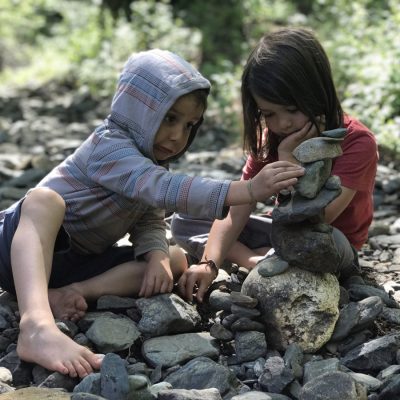
WHY EARTH INTIMACY FOR KIDS?
“Knowing that you love the earth changes you, activates you to defend and protect and celebrate. But when you feel that the earth loves you in return, that feeling transforms the relationship from a one-way street into a sacred bond.”
(Robin Wall Kimmerer)
(Robin Wall Kimmerer)
Why Earth Intimacy for Kids?
In stark contrast to Robin Wall Kimmerer’s beautiful words, James Watt — inventor of the steam engine — said: “Nature can be conquered; if we can but find her weak side.” This dangerous idea that humans are separate from and superior to “nature” shape systems, structures, and messages that influence our lives in countless ways. But we are nature, no better or worse than the other beings around us, only different. We believe our future depends on understanding and embodying our interdependent place in the ecological web.
Earth Intimacy is simply the process of nurturing our relationships with the environments we inhabit, loving them, and coming to understand that we are a part of the web of life, not apart from it.
The younger we cultivate that embodied understanding, the more likely it will influence values and actions throughout one’s lifetime. And so, we believe that nurturing Earth Intimacy in kids is vital.
Sadly, research shows that children in the U.S. spend an average of 4 to 7 minutes in unstructured outdoor play compared to 7 hours in front of screens. You read that right: 7 minutes of green time, 7 hours of screen time.
There is so much room for improvement, and we believe wholeheartedly that it’s possible — especially because the benefits of “green” time are so clear. Research confirms that time outside promotes physical and mental health, and that’s true for humans of any age. As we prioritize Earth Intimacy in the youngest generation, relationships founded in connection, love and kinship can guide lifelong actions for protection and care.
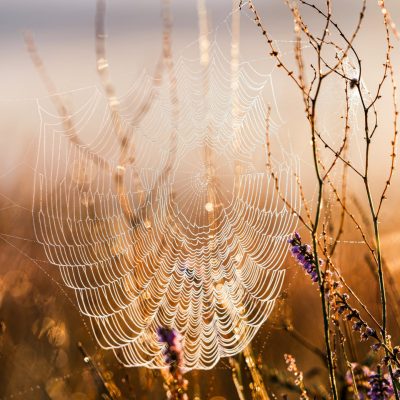
WHY CO-LIBERATION WITH KIDS?
“Nobody’s free until everybody’s free.”
(Fannie Lou Hamer)
Why Co-Liberation With Kids?
Fannie Lou Hamer’s words illuminate the interdependence of all peoples and all struggles for freedom. The sentence is simple, but the reality it describes is truly profound. Freedom is dynamic, individual, and collective, and it requires everyone’s active participation to achieve and maintain. Inspired by Hamer and so many visionaries, we use the term “co-liberation” to refer to the efforts that move us closer to freedom for all, including the Earth itself.
Co-liberation implies that we have work and practice to do together — and we most certainly do! But it’s also essential to recognize that the work is different depending on who we are… and more specifically, how protected and prioritized we are within the society we live in.
How does this relate to childhood education? Well, the truth is that we begin to learn the rules of society from a very young age. The fancy word for this is “socialization.” With each passing year, socialization becomes harder to undo — imagine you’re a salmon swimming upstream, and each year the current becomes stronger. The earlier we can start the process, the less there is to unlearn.
We believe that a better society — one in which all people are free to be themselves without retribution — depends on educating youth about these topics from the get go. With care and age-appropriate curriculum, we can lay foundations that support critical thinking, honest conversations and behaviour change, which we hope will add up to stopping the inheritance of injustice from being passed down any further.
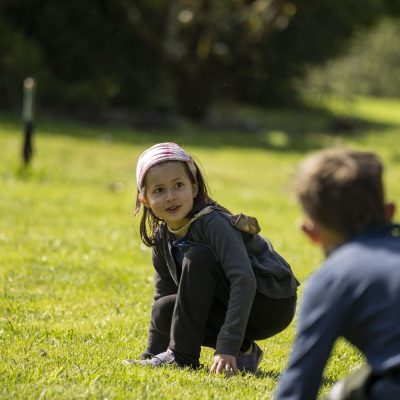
WHY EMBODIMENT WITH KIDS?
“Our bodies are the earth in human form.”
(tayla shanaye)
Why Embodiment With Kids?
Our bodies undergo remarkable changes as we mature from infancy to adolescence, and these changes are deeply supported by our intimacy with the Earth. After all, as a species, we evolved in intimate contact with our environments: the sunlight, the winds and breezes, the uneven ground… everything that makes up the ecosystem — always living, always changing. We are ecological beings and the outdoors is an ideal playground to cultivate (and celebrate) our senses — taste, touch, smell, hearing, sight, proprioception, and intuition.
Embodiment at Wild Tenders has two dimensions:
1. We support youth to grow more fully into their physical, emotional, sensory and relational selves.
2. We teach tools for self-regulation, which support emotional and relational wellbeing.
As we explore, play, crawl, balance, listen, observe, and reflect, we are attuning our whole individual systems to the whole collective system we are a part of. With guidance, practice, and time, this exploration teaches us to notice more acutely what is happening in our bodies, and how those happenings are impacting and being impacted by what is going on around us. This sensitivity is a crucial skill for navigating the world, both physically and emotionally, and it supports an embodied sense of ourselves as interdependent, ecological beings.
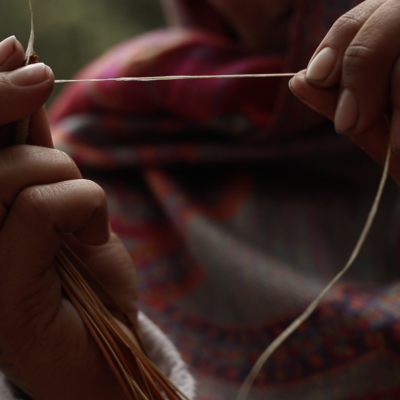
WHY prayErful action with KIDS?
“To love a place is not enough. We must find ways to heal it.”
(Robin Wall Kimmerer)
Why Prayerful Action With Kids?
We want young people to feel informed, inspired and resourced to contribute to the world around them. Prayerful action is how we refer to contributions that heal, that nurture life, that inspire, that promote freedom. It is a type of leadership that is considerate of the health and well-being of many generations to come.
Leadership is a complicated word. Our vision of leadership is not rooted in a single expert or a charismatic person who guides everyone else. Rather, leadership is collaborative. It is a balance between knowing one’s gifts and feeling confident to offer them, and at the same time, celebrating the gifts of others and co-creating containers that support the expression and celebration of each other’s gifts. It is equally important to understand our limitations and the places where we might grow. We make great effort in Wild Tenders to support the youth to see the gifts in themselves and others, to develop confidence in them, and also to believe that they can cultivate new gifts, skills, and awareness with time and practice (and guidance).
Service to the world can take so many different forms. After all, the Earth and the Earth’s inhabitants are ailing (and thriving) in so many ways — we want to support the thriving! Childhood can be a time of innocence, but not every child is fortunate enough to experience that luxury — and kids are often far more observant than we give them credit for … which is precisely why we need to talk to kids about what ails the world, particularly as they get older. To shield them from such realities is to hinder their capacity to respond — and perhaps their willingness. We believe that youth who are embodied, aware of the world’s ailments and wellness, and supported by an intimate relationship with the Earth will be well prepared for finding what prayerful actions are theirs to make in service to the whole.
V. APPLICATION
MULTIPLE KIDS?
Please submit a separate application for each child.
1. APPLICATION PERIODS
PHASE 1
APPLY BEFORE MONDAY, MAY 2nd 2022
HEAR AN UPDATE ON MONDAY, MAY 9th 2022
If you submit an application before Monday, May 2nd, we will consider your application as part of our first round of acceptance decisions. Submitting an application does not guarantee that you will be accepted in this first round. We will notify you of a decision on Monday, May 9th. If you are accepted, you will have two weeks (until Monday, May 23rd) to complete all of your registration paperwork and make a deposit to secure your spot.
PHASE 2
APPLY BETWEEN MONDAY, MAY 2nd and MONDAY, MAY 16th 2022
HEAR AN UPDATE ON MONDAY, MAY 23rd 2022
If you submit an application between Monday, May 2nd and Monday, May 16th, you will automatically be placed on our Waiting List and we will consider your application as part of our second round of acceptance decisions if there is space. We will notify you of your updated status on Monday, May 23rd. If you are accepted, you will have two weeks (until Monday, June 6th) to complete all of your registration paperwork and make a deposit to secure your spot.
PHASE 3
APPLY AFTER MONDAY, MAY 16th
HEAR AN UPDATE WITHIN TWO WEEKS
If you submit an application after Monday, May 16th, you will automatically be placed on our Waiting List and we will consider your application as part of our third round of acceptance decisions. We will notify you of your updated status within two weeks of receiving your application.


